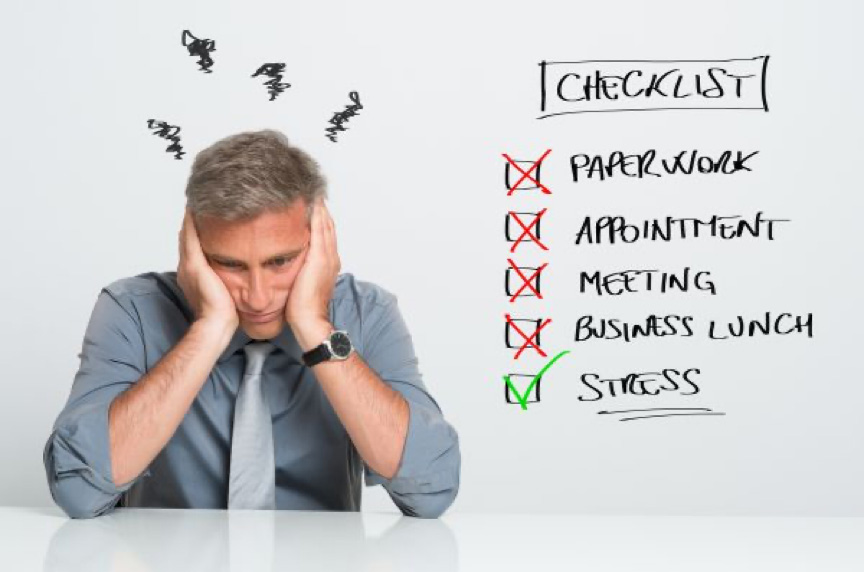Are numerous job tasks and responsibilities drowning you in stress and worry? Chronic stress can lead to anxiety or depression with inadequate coping skills. Unexpected stressors are inevitable, yet how we handle circumstances makes all the difference. Keeping a positive attitude empowers people to take-on daily challenges with a new and refreshed mindset, welcoming change and opportunities.
10 STRESS-REDUCING TIPS!
1. Create Healthy Habits: Introduce activities that embrace relaxation, like walking in the park, smelling the ocean breeze, sipping a cup of tea, lighting candles, and introducing aromatherapy. You decide how often to do these activities and the times that are most beneficial.
2. Stop Worrying: Put a stop to negative thoughts. This doesn’t mean your thoughts and concerns are not valid, but we can choose what thoughts to embrace and those to release. Dr. Jon Kabat-Zinn, founder of The Stress Reduction Clinic in the University of Massachusetts, shares clinical studies and advice on powerful ways of handling stress. Dr. Kabat-Zinn gives an insightful metaphor in his book, Mindfulness for Beginners, stating that thoughts are like bubbles. He goes on to say how thoughts are just thoughts that arise and go. Many times we make thoughts to be “the reality” and make decisions based on these thoughts. The idea is to not entertain negative thoughts as the ultimate truth, but rather to see them as mere thoughts.
3. Decrease Caffeine Intake: Aside from sodas and coffee, there are other products that are also caffeinated. Here are some examples of foods containing caffeine: dark chocolate, caffeine flavored ice cream, some gums, energy drinks, and certain teas. WebMd outlines highly caffeinated foods in their article, Caffeine Shockers: Products Surprisingly High in Caffeine.
4. Practice Relaxation Techniques: Relaxation techniques like meditation, yoga, stretching, breathing techniques, and tai chi are great ways to decrease stress and anxiety. WebMd has a great article titled, 10 Relaxation Techniques that Zap Stress Fast, that provides tips on ways to relax and reduce stress.
5. Get Motivated: We can all use a positive perk during stressful situations or challenging times. Some ways to motivate yourself include: Printing a list of motivational quotes, listening to inspirational speakers, and reading self-help books. The key is to feel uplifted and inspired after listening or reading some of these materials.
6. Laugh a Little: The power of laughter is priceless! Think of something that brings you joy. Perhaps it’s a funny movie, a comedy show, or a speaker who brightens your day. Laughter is the Best Medicine, is a great resource article which outlines the health benefits of laughter. Next time stress levels rise, take a moment to think of something funny or joyful. A simple laugh can brighten your day.
7. Monitor Your Nutrition: During stressful times everything else seems more important than healthy food choices. This is not the case for everyone, but it is a common response when faced with many stressors. Keeping watch on your nutrition and health is crucial during stress, with decrease immune response making individuals more susceptible to illness. Incorporate small frequent meals that are rich in vitamin C, zinc, calcium, and protein. These ingredients help boost your immune system, maintain a healthy weight, and promote bone health. Carrying to-go snacks such as bananas, granola, peanuts, apples, and cereal, are great ways to preserve your energy, prevent fatigue, and maintain healthy blood sugar levels.
8. Create a Schedule: Planning and scheduling activities helps with organizational skills and decreases stress. Try using calendars, planners, electronic scheduling devices, and alert systems. There are numerous tools that can be downloaded on electronic devices to help manage your busy schedule.
9. Make a Priority to Sleep: High demands and responsibilities keep us busy doing things, thinking ahead, and planning. More often than not, sleep is not a priority until the point of mental or physical exhaustion, or both. This creates a cycle of energy depletion that contributes to even more stress. Plan activities that require less mental and physical energy in the evening and promote relaxation like reading, meditation, and knitting.
10. Do Something Fun: Make time to do something you enjoy each week. This can be a hobby, activity, event, or experience. The idea is to disconnect from daily stressors, while having something to look forward to each week





